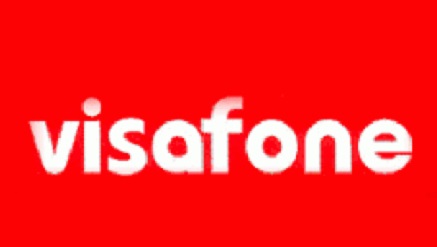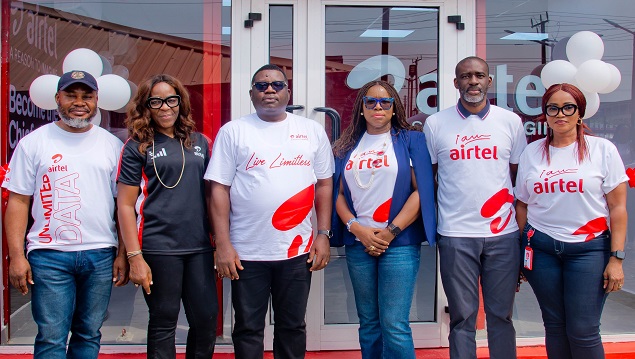Telecom
Reports Link Vodacom, MTN in Race to Acquire Visafone

Different reports at the weekend indicated that Vodacom Group Limited (Vodacom) and MTN Group are quietly competing in the race acquire Visafone, the only surviving Code Division Multiple Access (CDMA) operator in Nigeria.
Some people with knowledge of the matter said that talks are at an advanced stage, and a deal may be imminent but the potential purchase price and other details couldn’t be learned
Nigeria CommunicationsWeek gathered that the renewed interest by Vodacom to play in Nigeria’s telecommunications sector and Visafone is based on the exponential growth in the demand for data in the country.
Vodacom feels that CDMA technology which is suited for data service and coup with the fact that it is part owner of some undersea cable infrastructure that lands in Nigeria which includes SAT-3, WACS among others as well as its strong financial standing, it will be able to face competition especially in the data space of the telecom market.
Mr. Srinivasa Venkatappa, chief executive officer, Visafone told Nigeria CommunicationsWeek through Francis Enyogai his personal assistant that he does not know anything about such discussion and that if it happens, the company will communicate to the public through its communication channel.
Efforts made to reach Guy Clark, managing director Vodacom Business Nigeria, a subsidiary of Vodacom and other principal officers of the Company proof abortive as they travelled to South Africa for the company’s annual convention.
It would be recalled that Vodacom’s interest in Visafone is its second attempt; the first was when it bought into Econet now Airtel Nigeria and later pulled out as a result of what it described as corporate governance issues.
Visafone was born out of the strategic acquisition of 3 CDMA mobile network operators that had been in operation for up to 8 years with 30,000 subscribers and coverage in different parts of Nigeria.
The company, which was incorporated in Nigeria on June 20, 2007 following the acquisition of Cellcom received its Unified Access Service Licence as a telecom operator from the Nigerian Communications Commission (NCC) on August 1, 2007 positioned it to offer mobile, fixed and any other telecommunications service to its subscribers.
On the other hand, from its roots in South Africa, Vodacom has grown its operations to include networks in Tanzania, the Democratic Republic of Congo, Mozambique, and Lesotho and provides business services to customers in over 40 African countries such as Nigeria, Zambia, Angola, Kenya, Ghana, Cote d’Ivoire, and Cameroon.
It was owned on a 50:50 basis by the South African telecommunications group Telkom and the British mobile phone operator Vodafone.
Elsewhere, MTN Group, Africa’s largest telecoms operator was also reportedly in talks to buy Visafone Communications to solidify its grip in the South African firm’s most important market, sources familiar with the discussions said on Friday.
The report by Reuters claimed that wireless-network operator Visafone was set up eight years ago to deliver voice and broadband services through mobile and fixed telecom platforms after business tycoon Jim Ovia, who also founded Zenith Bank, acquired three operators.
“The deal is done. We’re almost putting ink to paper,” a source close to the deal said.
Another source said the talks would conclude “very soon”.
Both sources did not say how much MTN would spend on the purchase and how big a stake in Visafone it would take up.
Visafone grew its subscriber base from 30,000 after the acquisitions in 2007, to 2.2 million at the end of 2014, data from the telecom’s regulator showed.
But fixed wireless operators with CDMA technology platforms most suited for broadband and data services have faced stiff competition from more established rivals such as India’s Bharti Airtel, Dubai-based Etisalat and MTN, hitting the industry’s average revenue per user (ARPU).
ARPU, a key gauge of telecoms firms’ competitiveness as well as of consumer spending trends, has declined over the past three years to $5 from $8 as competition deepens.
MTN had nearly 60 million users in Nigeria in 2014, about 27 percent of its entire subscriber base across 22 countries.
Africa’s most populous country is also the biggest contributor to MTN’s revenue, providing more than a third of overall turnover.
Telecom
Airtel to Redefine Customer Experience with State-of-the-Art Retail Store

Airtel Nigeria, as part its ongoing commitment to delivering a seamless and exceptional retail experience for its customers has launched its new Company-Owned-Company-Operated (COCO) retail store in Sangotedo, Lagos, on Friday, 24th January 2025.

The new retail store aligns with Airtel’s dedication to providing topnotch experience for its customers, offering end-to-end customer support, instant activation of new SIM cards, bill payments, data plan subscriptions, device purchases, and troubleshooting services.
Speaking during the launch, Femi Oshinlaja, Chief Commercial Officer, Airtel Nigeria, reiterated Airtel’s commitment to delivering world-class service to its customers.
“At Airtel, our mission has always been to delight our customers by delivering unmatched satisfaction and we understand that connectivity is the lifeblood of modern business and everyday life. This is why we are passionate about ensuring that every customer’s journey with us is seamless, convenient, and rewarding,” he said.
“We are proud to be part of the Sangotedo community and excited to deepen our partnership with the people and businesses in this vibrant part of Lagos. This shop is a reflection of our belief that access to excellent telecommunications services should be within everyone’s reach,” he added.
The launch event was attended by senior Airtel executives and included a guided tour of the cutting-edge facility, showcasing the innovative features and personalized services that customers can now enjoy. Leveraging the latest retail technologies and best practices, the store sets a new benchmark for customer service excellence in the telecommunications industry.
In her closing remarks, Human Resources Director, Airtel Nigeria, Adebimpe Ayo-Elias emphasized Airtel’s goal in promoting quality customer service.
“At Airtel, we understand the importance of having a conducive environment for effective customer service and with the launch of this new shop, we have made provisions for 24 seats to accommodate everyone.
“Every customer who walks in is assured of receiving top notch quality customer care. We would continue to be the reason to imagine and look forward to achieving even greater milestones,” she said.
Airtel remains committed to enhancing its retail footprint across Nigeria, ensuring customers have convenient access to superior telecommunications services.
Telecom
How to Empower Nigeria’s Renewable Energy Future

For decades, Nigeria’s power sector has been on shaky ground — struggling with unreliable electricity supply, aging infrastructure, and an overdependence on fossil fuels. Grid collapse has become a recurrent experience, forcing households and businesses to rely on expensive and polluting generators. Amid these challenges, past and present governments always paint a hopeful picture of reforms and investments aimed at improving the grid.

Yet, in a world rapidly shifting towards renewable energy, true progress will not come from patching up a failing system but from embracing a sustainable, green energy future. Indigenous brands like iPower are already leading the way, proving that Nigeria does not have to be left behind.
The global energy landscape is undergoing a transformation. In fact, with the Paris Agreement, more than 110 countries have committed to a net zero emissions target by 2050. Renewable energy has become the new frontier as nations race to reduce carbon emissions and combat climate change. Solar farms are stretching across the Sahara, wind turbines are rising along coastlines, and battery technology is advancing at an unprecedented pace. Countries like China, Japan, and the US, which once relied on coal and crude oil, are now investing heavily in clean energy solutions — not just for environmental reasons but because renewables are proving to be more economically viable in the long run.
Africa, with its vast untapped solar and wind resources, is uniquely positioned to capitalize on this shift. Countries like Kenya, Egypt, and Morocco are already harnessing these resources to power industries, businesses, and homes by investing substantially in solar, wind, and hydroelectric power. Kenya, for instance, generates nearly half of its energy supply from geothermal energy. The question is: Will Nigeria seize this opportunity or remain trapped in outdated energy policies?
One of renewable energy’s biggest advantages is that it provides off-grid solutions — a crucial benefit for remote villages where electricity grids are non-existent. Solar panels, wind turbines, and hydro mini-grids are offering lifelines to communities that have long been neglected by traditional energy providers.
Beyond environmental benefits, renewable energy presents a strong economic case. Traditional power sources come with high fuel costs, maintenance expenses, and environmental levies. In contrast, solar and wind energy offer long-term savings, reduced reliance on imports, and the potential to create thousands of jobs in manufacturing, installation, and maintenance.
A stable power supply means extended operating hours and increased productivity for small businesses, uninterrupted medical care for hospitals, and access to digital learning tools even after sundown for students. Energy access is not just about convenience — it’s about economic empowerment.
Nigeria cannot afford to sit on the sidelines. Forward-thinking companies like iPower, which has a vision to power Africa sustainably, are proving that clean energy solutions can be accessible, affordable, and effective. Unlike generic imports, iPower’s renewable energy products are specifically designed to meet Nigeria’s unique energy needs — factoring in extreme weather conditions, infrastructural gaps, and affordability.
iPower’s product lineup includes solar home systems that provide uninterrupted power for households, portable energy solutions for businesses and remote areas, and advanced battery storage technologies to ensure consistent electricity supply even during peak usage hours. Beyond just providing products, iPower is shaping the future of renewable energy in Africa by investing in education and awareness campaigns, ensuring that more people understand the benefits of switching to clean energy. By integrating innovative financing models and local partnerships, iPower is making it easier for Nigerians to transition to clean, reliable energy solutions without the burden of high upfront costs.
For Nigeria to become a key player in the global renewable energy sector, both private enterprises and government action must align. Companies like iPower are already making strides, but government support is essential to scale these efforts.
The government can play a critical role by providing incentives such as tax breaks and subsidies for renewable energy projects, investing in infrastructure to support large-scale solar and wind energy farms, partnering with private companies to expand access to affordable clean energy solutions, educating the public on the benefits of renewable energy adoption.
The world is moving towards a clean energy future, and Nigeria has a choice: act now and lead the transition in Africa or risk being left behind. With iPower at the helm, the vision of a sustainable, self-sufficient Nigeria is no longer a distant dream — it is an achievable reality.
The future is not in generators that guzzle fuel or diesel and pollute the air. The future is in the power of the sun, the strength of the wind, and the innovation of homegrown companies like iPower. The time to act is now.
Telecom
Galaxy Backbone Celebrates Excellence and Innovation in Its People

Galaxy Backbone (GBB) proudly recognizes the outstanding efforts of its employees, whose dedication and innovation have significantly contributed to the organization’s success and recognition in recent times.

These achievements underscore GBB’s unwavering commitment to excellence in service delivery and pioneering technological solutions that advance Nigeria’s public sector.
The development, launch, and implementation of the GBB GovMail Email Platform in November 2024 by the Head of the Civil Service of the Federation, marked a transformative milestone in Nigeria’s digital transformation journey. GovMail provides Civil and Public servants across the public sector with a secure, efficient, and reliable platform for official communication.
By fostering seamless collaboration and ensuring the integrity of government data, GovMail directly supports the federal government’s vision for a digitally enabled public sector that prioritizes accountability and efficiency.
This groundbreaking initiative was driven by an exceptional teamwork, led by GBB’s, Head of Cloud Operations and supported by GBB’s team of Cloud Solution Specialists. Their innovation and “can-do spirit” embody GBB’s commitment to delivering cost-effective technology solutions that empower governance and enhance service delivery to citizens.
In recognition of their outstanding contributions, the team members were formerly recognized and commended by GBB’s Executive Management, led by the Managing Director/CEO, Professor Ibrahim A. Adeyanju. The expressed delight by the team’s spirit, commitment and dedication and encouraged other members of Staff to emulate their great work for GBB, the Public sector and the nation at large.
In a similar way, GBB also commended a member of its Datacentre Team for his exceptional skill and dedication in responding to a critical incident at the National Shared Services Centre (NSSC) in 2024. His swift actions safeguarded critical infrastructure, and ensured uninterrupted business continuity. These Individuals have in their unique ways, shown professionalism and technical expertise, which aligns with GBB’s core values.
These commendations highlight GBB’s dedication to fostering a culture of excellence, innovation, and recognition. Through initiatives like GovMail and the unwavering efforts of its talented workforce, GBB continues to lead the charge in advancing Nigeria’s digital transformation agenda and strengthening governance through cutting-edge technologies.

 E-Financial1 day ago
E-Financial1 day agoMoniepoint MFB Says Rumours of N1.1Bn Theft by Hackers Malicious

 General News1 day ago
General News1 day agoCourt Orders Arrest of Access Bank Acting MD, Others over Alleged Theft of Property

 Telecom1 day ago
Telecom1 day agoSERAP Drags Tinubu, Others to Court over ”Arbitrary” Telecom Tariff Hike

 E-Financial1 day ago
E-Financial1 day agoWorld Bank Urges CBN to Sustain Inflation Control Measures

 Telecom1 day ago
Telecom1 day agoFG, WIOCC Partner to Deliver Internet to 3m Homes with $10m Investment

 E-Financial1 day ago
E-Financial1 day agoZenith Bank Reinforces Commitment to Staff Wellbeing with Salary Hike and Promotions

 E-Financial1 day ago
E-Financial1 day agoSEC Warns against Transactions with Risevest, Stecs Cooperative Societies

 News1 day ago
News1 day agoARCON to Sanction Perpetrators of Misleading Adverts























